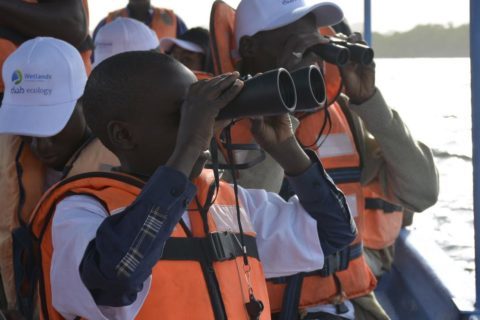
Birdwatching connects children with nature in Senegal
-
International Waterbird Census
-
Species
Students of the Saloum mangrove clubs and their teachers joined a first edition of bird counting in Senegal, Africa. They learned about the importance of mangrove ecosystems and the counting of water birds along migration routes. This was an opportunity to connect children with nature and birds using binoculars, guides and bird identification boards
Students of the Saloum mangrove clubs and their teachers will long remember this first edition of counting initiation. Student members from four villages in the Saloum Delta (Mbam, Foundiougne, Sokone and Dassilamé) in Senegal, Africa, and their teachers participated in an initiation session to counting waterbirds, alongside the international count organized on January 15, 2020 in the Saloum delta. This day was possible thanks to a partnership established between the Directorate of National Parks of Senegal (DPN), the Marine Protected Area (MPA) of Bamboung and Wetlands International Africa.
Captain Kante, curator of the Bamboung MPA, animated this first initiation session with a master’s hand. He first explained the importance of mangrove ecosystems and the counting of water birds along migration routes, before answering questions from the “budding ornithologists” who were very enthusiastic to participate in this meeting. Subsequently the group crossed the bolongs of Toubacouta to do a practical counting exercise. The students observed and counted different species of birds, including cormorants, ospreys, sacred ibis and others.

This practical part was an opportunity to familiarize children with the use of binoculars, guides and bird identification boards. “This educational outing is the best way to connect students with nature and birds. Students and even teachers have better understand the importance of the annual waterbird count, ” according to Madame Senghor, a teacher at Dianco Mané primary school in Dassilamé, Senegal. She ended by appealing to Wetlands International Africa and its partners to continue supporting schools through this kind of practical nature discovery activities.
“I didn’t know that bird counting is important and exciting at this point. What I learned today makes me want to become a birdwatcher and serve the cause of conserving birds around the world. I better understand the importance of birds and their interrelation with the mangrove that surrounds us, ” said Arame Wade, a pupil of the mangrove club of Foundiougne, to journalists from community radio stations in Sokone and Niobanto who came to cover the event.
Youssoupha Sane is coordinator of the mangrove club network, and teacher at the Mbam 2 school. He renewed, on behalf of his teacher colleagues, their gratitude for the permanent support of Wetlands International Africa through its projects in the sustainability of the mangrove clubs of the Saloum Delta, before declaring: “The mangrove clubs contribute to promoting excellence in our schools, because we give the chance to those who have the best school results in joining clubs is also a way to reward them.”
Before the closing remarks by Colonel Ibrahima Gueye, head of the wetlands division at the DPN, the students and their teachers agreed to share what they learned with their school friends and to prepare for the celebration of World Migratory Bird Day to better mark their commitment to become ambassadors for birds and mangroves.
